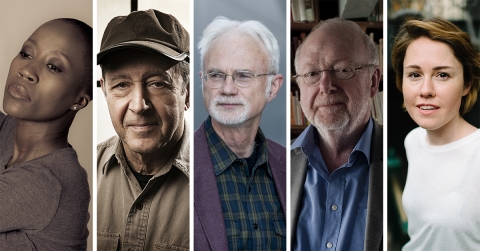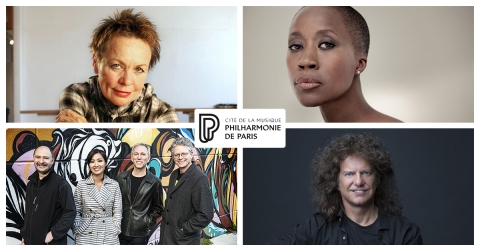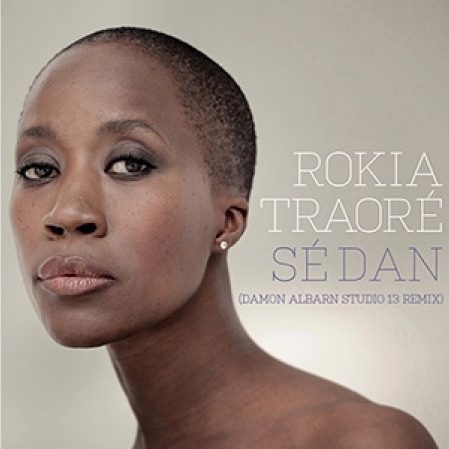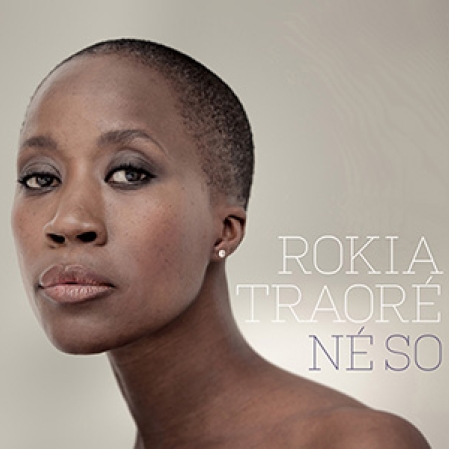On her Nonesuch debut, Malian star Rokia Traoré mixes traditional instrumentation with a modern sensibility for a mesmerizing set that includes a guest appearance from Kronos Quartet. The Boston Globe labeled her “one of the rising stars of Malian music.”
Having already achieved considerable critical and popular acclaim with her first two albums, Rokia Traoré's next step was Bowmboï, the fullest realization to date of her musical vision: a global patchwork so broad that the Kronos Quartet fits seamlessly on the album and The Daily Telegraph has likened her to Björk. With Bowmboï, Traoré emerged as a veritable star in Europe. By its US release on Nonesuch in 2004, the album had sold more than 100,000 copies in France alone and had provoked rave reviews by everyone from MOJO to Rolling Stone to Elle and Time, which has said of the album, “Bowmboï is mesmerizing, casting its spell with virtuoso vocals, rich textures and startling diversity.”
While the arrangements on Bowmboï are simple and sparse, the album is rich in musical and lyrical depth. Traoré draws on the vast diversity of cultures she has experienced. Born into a well-educated Malian family, Traoré is the daughter of diplomat and has lived everywhere from North Africa to the Middle East to Europe, as well as in the Malian capital, Bamako, where she was once a member of a high school rap group. In 1996, she appeared on Mali’s foremost music TV program with two songs, “Finini” and “Mouineïssa,” which became local hits and were later included on her debut album.
Through the years, Traoré continued to return to Mali, remaining connected to the history and culture of the country. But if Traoré’s Malian roots are audible on Bowmboï, so too is the iconoclastic spirit in which she incorporates them without adhering to any traditional musical model. The first track “M’Bifo” opens with the plucking of an n’goni, an African lute, but the result, when combined with Traoré’s soaring vocals, is a thoroughly contemporary folk song.
Similarly, on Bowmboï, Traore—who is fluent in several languages—sings exclusively in her native Bamanan, a language she chose because its particular richness in metaphor and texture allows her to write and sing in a distinctive new way. As she told The Daily Telegraph, “I respect what [traditional praise-singers] do, but I’ve never wanted to compete with them. I don’t have their traditional training and background. I’m more interested in inventing a new way of singing.” According to The Times (UK), she reaches this goal on Bowmboï: “Her voice transforms everything it touches. Sometimes caressing, sometimes keening, it is as agile as some rare desert bird.”
Not only is the style of her singing distinct, but so are the poetry and social consciousness of her lyrics, which often urge women, in Africa and everywhere, to find their strength and transcend the confines of conventional gender roles. In “Kote Don,” for example, she speaks out about conventional thinking in all areas: “I dislike what is rigid, set / What ‘is’ without knowing why / All that is hierarchical, static / I respect my elders / But tradition is not infallible / It is not absolute / Time passes, we all change / Nothing remains the same.”
Traoré’s acclaim has grown continually since even before the release of her debut album. In 1997, she won the Radio France International prize for African Discovery of the Year before releasing her 1998 debut Mouineïssa to overwhelming praise. Traoré’s second album, Wanita, further raised her critical profile. Nominated for a BBC World Music Award, the album was chosen as the best folk/roots/world release of 2000 in the fRoots magazine critics poll, and Billboard called it “one of the finest records issued anywhere this year.” Wanita also made numerous Best of 2000 lists, including that of the New York Times. In a continuing celebration of an evolving performer and songwriter, the same panel of journalists that awarded Wanita the 2000 award for best folk/roots/world release deemed Bowmboï the #1 World Music Album of 2003 in the BBC Critics’ Poll.
Traoré is perhaps most celebrated for her live shows, which Time Out London says are “arguably the most exciting, most thrilling live African music show around.” The Guardian said of a Queen Elizabeth Hall show, “The audience leave in no doubt that this was one of the best shows of the year, and that they have just had the honour of witnessing a true star in the making.”
PRODUCTION CREDITS
Recording: Philippe Teissier du Cros
November 2002 at Studio Bogolan (Bamako); assistant: Yves Wernert
February 2003 at Studio Boxson (Paris); assistant: Michaël Seminatore
Strings recording: Leslie Ann Jones
December 2002 at The Site (Marin County, California); assistant: Kevin Scott, Digital Editing: Mark Willsher
Mixed by Philippe Teissier du Cros March 2003 at Studio Boxson (Paris); assistant: Michaël Seminatore
Mastering: Tony Cousins at Metropolis
Production: Thomas Weill
Kronos Quartet recording produced by Judith Sherman
String quartet arrangements by Stephen Prutsman
Design by Gilles Guerlet & Jérôme Witz
Photos: Frédéric Thomas
79852
This album is available from Nonesuch in the United States, Canada, Japan, and Korea only.
MUSICIANS
Rokia Traoré, lead vocals, backing vocals, guitar
Djibril Camara, bolon (6)
Sidiki Camara, percussions (2, 3, 9)
Alou Coulibaly, percussions (3, 4, 7)
Mamah Diabaté, n’goni (1-4, 7, 9)
Adama Diarra, balafon (3, 9)
Charlotte Dipanda, backing vocals (1, 4, 7)
Andra Kouyaté, n’goni, Percussions (2-4, 7, 9)
Kronos Quartet, strings (David Harrington, violin; John Sherba, violin; Hank Duttv, viola; Jennifer Culp, cello) (5, 10)
Christophe ‘Disco’ Minck, bass (1, 2, 7), guitar cithar (6)
Ousmane Sacko, vocals (4)
Steve Shehan, percussions (2-4, 7, 9, 10)
Baba Sissoko, n’goni (6, 10)










